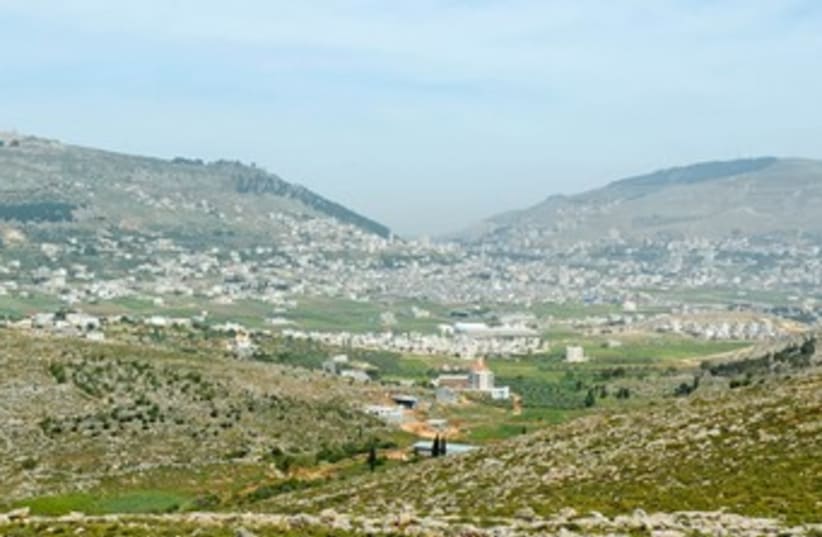‘When you have crossed the Jordan into the land the Lord your God is giving you, set up some large stones and coat them with plaster.'Write on them all the words of this law when you have crossed over to enter the land the Lord your God is giving you, a land flowing with milk and honey... set up these stones on Mount Ebal, as I command you today...’ (Deut. 27:1-5)
Why are the Israelites commanded to leave trans-Jordan and travel through the heart of enemy territory all the way up to Mount Ebal overlooking Shechem (today Nablus)? After 40 years of wandering in the desert, what’s the rush to get to Shechem? This is particularly strange since the Israelites will then almost immediately return to where they started from. And why the urgency to write out the Torah on 12 stones in Shechem? The first explanation is based upon the biblical record that Abram heeded God’s commandment to leave his land (Ur of the Chaldees, Iraq) taking with him his wife, Sarai, his nephew, Lot, and all their belongings. When they reached Canaan, Abram continued to traverse the promised boundaries of Israel as far as Shechem. There, he built an altar to God who had appeared to him... (Genesis 12:5-7).
The Gaon of Lutzk, Rabbi Zalman Sorotozkin (1881- 1966), author of Oznayim L’Torah, points out that by coming to Shechem, the Israelites establish the fact that they’re not newcomers to Israel; their historical roots in this land go back to Abraham. They were exiled in Egypt, but now they’re returning to reestablish Abraham’s legacy. It was not the land’s fruit trees or physical beauty that brought them back to Israel; it was the fact that Israel was their Promised Land, originally settled and acquired by Abraham.Secondly, Shechem is one of three locations (along with Hebron and Jerusalem) which was paid for in cash. Jacob, after his long stay with Laban in Aram, returned and bought an open field, Shechem, for 100 pieces of money (Genesis 33:19).This combination of historical right (Abraham’s acquisition by settlement) and law (Jacob’s purchase), makes Shechem unique among Israel’s cities. Hence for the émigrés from the desert to travel first to Shechem was like bringing visitors straight from Ben-Gurion Airport to the Kotel (Western Wall).But it’s not just a history lesson. When the Jews are commanded to write the Torah on 12 stones, past memory becomes future destiny. For although the Jewish right to the land may be historic, Jews will not be able to live on the land unless they keep the ethical, moral and ritual commandments of Torah.This is what guarantees that Israel will not be the mere grave of our past but will remain the homeland of our future.And the Torah is more than the Constitution of Israel.The verses concerning the Jews setting up these 12 stones end with the words “be’er hetev,” which literally mean “explained clearly.” Quoting from the Mishna (Sota 7:1), Rashi explains that “be’er hetev” means that the Torah was written “in 70 languages,” symbolizing the 70 nations.In other words, the sages understood that a further condition for our maintaining sovereignty over the land is that we must teach at least the moral laws of the Torah to the entire world.When God first elected Abraham, He explained that the Patriarch would be the father of a great nation through which all the families of the earth will be blessed. Indeed, God chose Abraham because he was “teaching his household to guard the ways of the Lord, to do compassionate righteousness and moral justice” (Gen. 18:18, 19).In the covenant with Abraham “between the pieces,” God established Israel, the nation; in the Covenant at Sinai, God established Israel, the religion; and in the Covenant at Shechem, God established Israel, His witnesses to the world! It is precisely this Third Covenant which expresses our universal mission.Shechem is also where Joseph, the son of Jacob-Israel, is buried.Joseph who never forgot God’s charge to Abraham to bless the world, Joseph who dreamt of Egyptian agriculture and eventually brought his entire family to Egypt, Joseph who taught Pharaoh about the God of Israel and the world, and it was Joseph who set the stage to teach the greatest power in the ancient world that God created every human being in His image and that God demands the inviolability and fundamental freedom of every individual. Joseph began the process which led to the Arab Spring today.And finally it was in Shechem that the children of Jacob-Israel waged their war against a tribal “nation” which perpetrated an act of rape upon Jacob’s daughter Dinah – and seemed to have done so with impunity. Shechem was the first example of the necessity of Israel to champion moral justice and human rights before the eyes of the world in the Fertile Crescent, the first place where Israel fought terrorism.Perhaps this is why our Promised Land is at the crossroads of the continent. From the very moment we crossed the Jordan, God charges us with perfecting the world under the Kingship of a God of love and universal law.Shabbat shalomThe writer is the founder and chancellor of Ohr Torah Stone colleges and graduate programs, and chief rabbi of Efrat.
